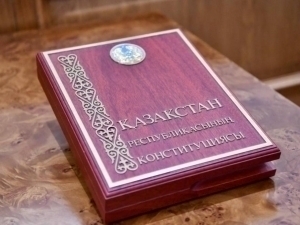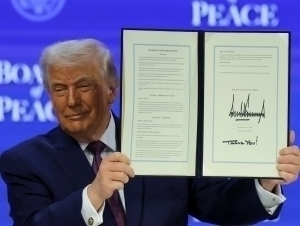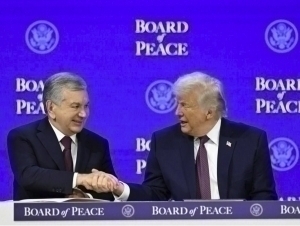Weekend: Kazakhstan draws a line for Russian deputies, Trump’s inner circle shrinks, Ukraine’s resources shared
Review
−
05 May 2025 8798 11 minutes
It has been revealed that the President of Kazakhstan has banned several members of the Russian State Duma from entering the country, citing actions that undermine Kazakhstan’s reputation. The blacklist reportedly includes not only lawmakers but also representatives from various sectors in Russia.
Former U.S. President Donald Trump appears to have achieved a long-term geopolitical objective. Many of Ukraine’s valuable natural resources are no longer exclusively under Ukrainian control. International stakeholders, particularly from the United States, have become significant partners.
While securing access to Ukraine’s wealth, Trump’s team is facing internal disruptions. The first major departure was that of Mike Waltz, who has now left his role as national security adviser. Overall, the stability and reliability of Trump’s team have come under question.
These developments were covered in detail on QALAMPIR.UZ’s "Weekend" program which summarizes key global events from the past week.
Ukraine to share natural resources with the United States
After months of negotiations, a long-discussed agreement between the United States and Ukraine has finally been signed. Under this agreement, several natural resources located within Ukrainian territory will now be co-managed with U.S. involvement. The deal, which has sparked considerable debate—including claims that it contributed to Trump’s strained relationship with President Zelensky—has faced criticism from international experts and was even cited during high-profile discussions in the White House.
On April 30, the United States and Ukraine formalized a mutual agreement to cooperate on the development and investment of Ukraine’s natural resources. According to Ukraine’s Deputy Prime Minister and Minister of Economy, Yulia Svyrydenko, the agreement is intended to support the country’s recovery efforts through foreign investment. A joint investment fund will be established to attract global investors.
The agreement consists of four key provisions:
1. Ukraine retains full ownership of its subsoil resources. All decisions on exploration and extraction will be made solely by Ukraine.
2. The cooperation will be on an equal basis, with the fund structured as a 50/50 partnership to ensure neither side holds an advantage.
3. The agreement includes no debt or financial obligations for Ukraine toward the United States.
4. Ukrainian state property will be protected. No privatization or changes in the management of key national companies such as "Ukrnafta" or "Energoatom" will occur under this agreement.
One notable omission from the agreement is any reference to security guarantees for Ukraine. This raises concerns that Ukraine must rely on the hope that U.S. economic interest will also translate into geopolitical support. Some critics have labeled the agreement “Trump’s plan to destabilize Ukraine.”
According to official statements from Kyiv, the agreement does not violate the Ukrainian Constitution and does not alter the country’s strategic orientation toward integration with the European Union.
Svyrydenko clarified that the fund will be financed solely by revenues from newly issued licenses. She emphasized that the fund, which will manage a significant portion of Ukraine’s natural resource projects, will not place a burden on the national budget but is expected to contribute positively.
“This includes around 50 percent of the revenue expected to be directed to the state budget from newly issued licenses for critical materials, as well as oil and gas projects. Funds from existing projects or already-budgeted revenues will not be redirected to this fund,” Svyrydenko said.
Importantly, income and contributions to the fund will not be subject to taxation in either the United States or Ukraine. This is expected to enhance the investment appeal and financial efficiency of the initiative. The U.S. government is backing the fund through the International Development Finance Corporation (DFC), which aims to attract investors from the U.S., the European Union, and beyond.
The DFC is a U.S. government agency created in December 2019 to support private sector investment in developing countries. Its mission is to advance U.S. foreign policy and national security objectives by facilitating private capital flows. The agency offers financial tools such as loans, guarantees, political risk insurance, and technical assistance. DFC’s portfolio includes projects in sectors like energy, healthcare, infrastructure, technology, and finance. Now, the DFC is expanding its footprint in Ukraine, particularly in the search for critical minerals. While some experts claim these resources are scarce, the agency’s increased activity signals a broader strategy aimed at long-term strategic investment in the region.
Kazakhstan closes its borders to Russian nationalist deputies
It has been revealed that several Russian deputies and activists known for their chauvinistic and provocative rhetoric have been banned from entering Kazakhstan. While no official confirmation has been issued, an internal government source confirmed the measure to "Deutsche Welle".
The issue came to light on April 27, when historian Andrei Grozin, an employee of the Russian Institute for CIS Countries, was denied entry upon arriving in Astana. Interestingly, Grozin had previously received an official invitation to attend events focused on Kazakh-Russian relations. However, upon arrival at the border, he discovered that his name was on Kazakhstan’s list of individuals barred from entry.
Grozin later told Kazakh media that no official explanation was provided for his denial of entry. His case suggests that Kazakhstan maintains a list of "undesirable persons," a fact that drew the attention of "Deutsche Welle", which then began investigating individuals who are not welcome in either Kazakhstan or Russia.
While the Kazakh government has not publicly stated the reasons, a government source provided some background to "Deutsche Welle". The source said Grozin should be more cautious with his statements, noting that authorities had not forgotten his past derogatory remarks about Kazakhstan.
“Grozin, who claims to be a historian, publicly said that President Tokayev's reputation had been damaged and compared the country to Nazi sympathizers aligned with the Turkestan Legion. He insulted the Kazakh people, portraying them as thieves and arsonists, and equated Kazakhstan ideologically with Ukraine in 2014. He may have forgotten these comments, but we have not,” the official said.
The same source noted that Kazakhstan’s entry ban list is confidential and not publicly disclosed. In the past, the late politician Vladimir Zhirinovsky was said to top the list. Currently, others banned from entering Kazakhstan include Tina Kandelaki, Tigran Keosayan, Alexander Dugin, Nikita Mendkovich, State Duma deputies Yevgeny Fyodorov, Vyacheslav Nikonov, Pyotr Tolstoy, and Konstantin Zatulin—all of whom have made disparaging statements about Kazakhstan or its leadership.
Meanwhile, Russia has imposed similar entry restrictions on certain Kazakh citizens. Historian Zhaksylyk Sobitov told "Deutsche Welle" that at least ten of his colleagues had been barred from entering Russia. Like Grozin, many were unaware of their status until attempting to cross the border or book flights on Russian airlines.
“These situations became more frequent after 2022, when people started openly sharing opinions on Facebook and Instagram. Now, not just historians but professionals from other fields are affected,” Sobitov said.
Experts interviewed by "Deutsche Welle" also named several Kazakhs banned from entering Russia. Among them are political scientists, civil activists, and even members of parliament such as Ermurat Bapi and Aidos Sarym. MP Sarym recounted that he was denied entry in 2021. During a layover en route to Brussels, the Kazakh embassy invited him to an event in Moscow. Despite holding a diplomatic passport, he was the only one in his delegation denied entry. At the border, a Federal Security Service officer handed him a document declaring him "persona non grata". The notice warned that attempting to enter Russia again could result in up to eight years in prison. Uzbekistan, too, maintains a similar list of foreign nationals deemed unacceptable for entry. However, the identities of those on the list are not publicly known. The legal basis for this is found in the Law "On the Legal Status of Foreign Citizens and Stateless Persons in the Republic of Uzbekistan," approved by the Legislative Chamber on June 25, the Senate on September 21, and signed by the president on November 15 last year. The law states that individuals who publicly insult the honor, dignity, or historical memory of the Uzbek people may be banned from entry.
It is worth noting that a number of Russian public figures arguably meet this criterion. For example, MP Zakhar Prilepin, who once called for the occupation of Uzbekistan; MP Oleg Smolin, who has made derogatory remarks about the Uzbek nation under the guise of historical analysis; MP Sergei Mironov, who criticized the Uzbek consulate in Kazan for urging migrants to avoid participating in war; and Foreign Ministry spokesperson Maria Zakharova, who demanded an explanation from Uzbekistan after an incident involving an Uzbek student—are all figures whose actions have been seen as undermining Uzbekistan’s sovereignty. Despite these incidents, it appears Uzbekistan has not yet enforced such entry bans. Just days ago, Maria Zakharova was seen accompanying Foreign Minister Sergey Lavrov during his visit to Samarkand, following the EU and CIS summits. From the moment the plane landed to her embrace with Uzbek Foreign Minister Bakhtiyor Saidov, Zakharova was given full access. It would not be surprising if Zakharova continues to comment on Uzbekistan’s internal affairs, potentially even attempting to lecture the country’s leadership. Yet, she still appears able to travel in and out of Uzbekistan without restriction.
Crisis unfolds in the Trump administration
A crisis appears to be brewing within Donald Trump’s administration, which is largely composed of multimillionaires and billionaires. In recent days, reports have emerged suggesting that Elon Musk’s role in the new government may soon come to an end. Discussions around his possible return to the private sector have intensified.
Trump previously stated that Musk had been brought into public service for a limited period and was free to remain as long as he wished. However, recent developments indicate that Musk is likely to exit the administration. Following the inauguration, he reportedly suffered significant financial losses. Some media outlets suggest that Tesla may already be searching for a new CEO. As such, it seems only a matter of time before Musk steps down from his role at the Agency for Government Efficiency (DOGE) and withdraws from politics altogether. The impact of his departure on Trump’s government remains unclear.
A more immediate crisis, however, is the dismissal of National Security Advisor Mike Waltz, who was recently involved in a serious breach of protocol by allowing a journalist access to a classified group chat. Many observers believe this act of carelessness deeply disappointed President Trump. Although Trump initially attempted to defend Waltz, growing distrust from other parts of the administration may have forced his hand. Waltz and his deputy, Alex Wong, have both resigned. The news was first reported by several media outlets and later confirmed by Trump himself.
According to "Politico", Trump acknowledged Waltz’s shortcomings, referring to him as “broken.” While earlier speculation suggested that Middle East adviser Steve Witkoff might replace him, Trump instead appointed Secretary of State Marco Rubio as the new national security advisor.
Waltz, 51, is a retired U.S. Army Special Forces officer with combat experience in Afghanistan, the Middle East, and Africa. He has previously served in both the White House and the Pentagon and was elected to Congress in 2018. A vocal critic of China—calling it an “existential threat”—Waltz has also questioned NATO allies' defense spending and expressed skepticism toward U.S. military support for Ukraine. He was involved in U.S.-Russia negotiations. According to Trump, Waltz will now serve as the U.S. representative to the United Nations.
In short, Waltz is out—but he may not be the last departure. Secretary of Defense Pete Hegseth is now under scrutiny for a separate, but similarly damaging, breach. Hegseth allegedly shared sensitive information related to U.S. arms shipments to Yemen not only with the White House and a journalist, but also in a private family chat. According to sources, senior officials are expressing as much concern about Hegseth as they did about Waltz. His position is reportedly in jeopardy. As a result, Trump’s cabinet—comprised of high-profile businessmen and media personalities—appears to be unraveling just four months into the administration. With nearly four years still ahead, the stability of the Trump government is already being put to the test.




